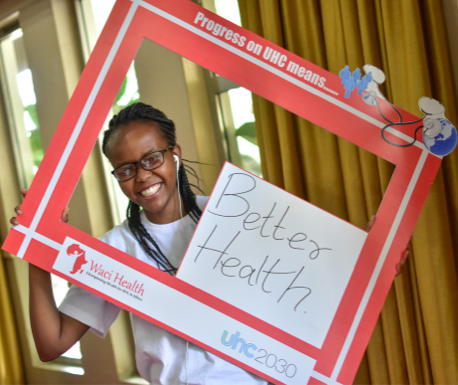UHC2030 hosted its annual UHC Day parliamentarian town hall to...
16 January 2018
CSOs meet in five countries to discuss action about UHC2030.
 CSO consultation in Kenya
CSO consultation in Kenya In 2017, the UHC2030 Civil Society Engagement Mechanism set up five country consultations to identify what is needed to reinforce a civil society movement for universal health coverage (UHC) at country level.
Five countries took part: Cameroon, Kenya, Nigeria, Pakistan and Zimbabwe. In each country, one civil society organisation (CSO) took responsibility for setting up a dialogue and meeting with health CSOs, community-based organisations (CBOs) and other national and international health stakeholders.
The meetings helped CSOs to identify the key UHC advocacy and accountability issues they face in their country, how to build a strategy to influence how UHC2030 translates into action in countries, and how to strengthen citizen voices and empower communities.
All consultations concluded with a series of options and proposals on how to set up national-level CSO engagement in UHC2030, and decide upon activities. A report drawing on all five consultations will be available soon.
UHC2030 interviewed CSO representatives in each country, and here are some key issues they highlighted about the consultations and ways forward.
Itai Rusike, Community Working Group on Health, Zimbabwe
“We [CSOS] need to strengthen community health structures. Communities need to be able to hold authorities accountable, be able to participate in national health programming, and give well-informed views on health.
“Communities need to participate from a well-informed point of view. The UHC2030 agenda needs to be popularized at community level; community leaders and traditional leaders need to know about it. We need to put the focus on the community level.”
Rosemary Mburu - WACI health in Kenya
“There is a big knowledge gap among civil society organisations and citizens about what the Government is planning and doing on universal health coverage at the country level. Therefore CSOs are not adequately prepared to engage in advocacy and accountability for UHC because of this knowledge gap. What are the entry points for UHC for example? This all needs to be addressed in order to make progress.
“CSOs need to be better coordinated among themselves. It is clear that the Government likes to collaborate with well-organised groups, and if CSOs are left out of any process it is for the reason they are not organised enough.”
Fogue Foguito from Positive Generation in Cameroun
"For the first time, health civil society organisations have come together to build an inclusive platform to work together and share expertise and ideas. This platform can make a difference because it is owned by CSOs and we are leading the process. We are not being directed by Government or Development Partners, and being invited into their spaces.
“The platform is directed by us and Government and Development Partners have come on board and support us. We have a core committee which managed the consultation workshop, and we have an action plan to bring together all CSOs working in health, some of which are UHC focused and others which are more general."
Sundas Warsi - CHIP in Pakistan
“The over-arching objective of the country consultations in Pakistan was to collaborate with community members in a bottom-up manner, and to cultivate a set of holistic recommendations for fulfilling the UHC2030 commitments.
The country consultation process raised a voice among CSOs and other Government personnel that Pakistan is committed to the target of UHC which calls for serious action. The CSOs’ enthusiasm, awareness levels about the SDGs and UHC targets and participation was remarkable. It is hoped that CSOs will discuss this issue with the Government to make it priority and work in a collaborative manner.” Photo: Waci Health, Kenya consultation
More UHC2030 News
A global health financing emergency threatens progress toward...
UHC2030 at HSR2024: Advancing equity and inclusion in health systems through civil society knowledge
UHC2030, in collaboration with the SUPPORT-SYSTEMS research...
